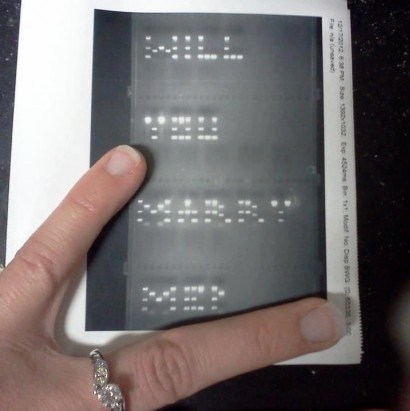Jen Fulwiler of Conversion Diary (who runs this blog carnival) was in the hospital yesterday with two pulmonary embolisms, and treatment is complicated, since she’s pregnant. Happily, she was discharged last night and is stable enough to be treated/monitored at home. If you’re part of the religious subset of readers for the blog, please keep her in your prayers.
And, if you’re looking for someone to pray to, Jen keeps a random saint generator running, so you can learn more about the saints and possibly take one of them on for the year to get to know better. I got St. John Neumann to watch over my first calendar year as a Catholic. (His feast day is tomorrow).
I’m glad Jen is doing better, but it’s been a frightening week, so let me cheer you all up with one of the cutest proposals I’ve ever seen:
It’s precisely cut DNA run through gel electrophoresis! Awwwww.
The next link comes to you via my brother, who has learned that I tend to only be interested in sports when there are puns (a la roller derby), abuses to oppose (football) or math, and he sent me a fascinating story from Grantland on “The Kobe Assist.”
Although the smartest basketball analysts evaluate success by possessions, for the most part the temporal extent of basketball analysis remains too narrow. Anyone who has ever acknowledged that the “assist” has some value has therefore admitted that basketball outcomes exhibit sensitive dependence on the events immediately preceding them. But this concept goes well beyond passing, is central to basketball strategy, and is part of what separates basketball from other games we love to measure. Baseball analytics had its epiphany in part because Bill James and others realized that baseball was only barely a team sport, and really could be reduced to a discrete sequence of outcomes that involved singular players competing in sequences of one-on-one scenarios. But basketball achievements do not occur in a vacuum; just as it is rare for one player to be solely responsible for a made basket, it is similarly rare for one player to be solely responsible for other types of events, including rebounds and put-backs.
Everyone I know has been sending round the New Yorker profile of Apollo Robbins, the theatrical pickpocket. but it really is so good I can’t resist sharing in case any of you haven’t seen it. This part is amazing:
A few years ago, at a Las Vegas convention for magicians, Penn Jillette, of the act Penn and Teller, was introduced to a soft-spoken young man named Apollo Robbins, who has a reputation as a pickpocket of almost supernatural ability. Jillette, who ranks pickpockets, he says, “a few notches below hypnotists on the show-biz totem pole,” was holding court at a table of colleagues, and he asked Robbins for a demonstration, ready to be unimpressed.
Robbins demurred, claiming that he felt uncomfortable working in front of other magicians. He pointed out that, since Jillette was wearing only shorts and a sports shirt, he wouldn’t have much to work with.
“Come on,” Jillette said. “Steal something from me.”
Again, Robbins begged off, but he offered to do a trick instead. He instructed Jillette to place a ring that he was wearing on a piece of paper and trace its outline with a pen. By now, a small crowd had gathered. Jillette removed his ring, put it down on the paper, unclipped a pen from his shirt, and leaned forward, preparing to draw. After a moment, he froze and looked up. His face was pale.
“Fuck. You,” he said, and slumped into a chair.
Robbins held up a thin, cylindrical object: the cartridge from Jillette’s pen.
But what I loved best is when Robbins talked about how he taught himself thieving and mentioned he drew on aikido and ballroom dance. When he demonstrates one technique on the reporter, I recognized the seed of the move from aikido class and a way to get into shadow position in rumba. Huzzah!
Earlier this week, when I was reviewing a book about Mormonism, Michael H, a practising Mormon and a college friend of mine did yeoman’s work in the comment threads — answering questions, talking about his experience, and always raising the tone of the conversation. He has a blog of his own, and all y’all may be interested in his recent post on what he makes of the secrecy of certain rituals in his faith.
However, the LSAT and other standardized tests demonstrate that there are circumstances in the non-Mormon world with secrets as closely and zealously guarded as the verbiage of the Mormon temple ordinances – perhaps even more so, for the questions change for each test, whereas temple ordinances seldom change and have been published far and wide on the internet. Maybe some of the reasons for the parallel norms of secrecy are similar: the significance of the LSAT and similar tests lies in the presumption that the candidates are encountering those specific questions for the first time. Though they could be informed of the format of the exam, the types of questions they could find, and strategies for interacting with the questions that they will eventually be required to answer, if they had seen their particular test booklet previously, the resulting experience would be fundamentally altered. It is requisite to encounter the test at the right place, at the right time, and in the right manner, or it loses much of its purpose. For this reason strict secrecy is implemented thereafter: test administrators wish to prevent those who have taken the test from corrupting others’ experience. While us veterans can speak in generalities because we understand the implications of specific words (“Ugh, three logical reasoning sections?” or “What about that question with Iturbe, Hong, and Franco?”), we are enjoined to say nothing more.
Via Statistical Modeling, Causal Inference, and Social Science, a map of isolines of travel distances to various parts of the US in 1857. The mapmakers back then assumed you were setting out from NYC, natch.
Also, I just want to remind you to get in contact with me if you think you might be interested in joining the February Math & Theology bookclub/guestblogging extravaganza. So far, eleven of you folks have told me you’re getting the book and want in. Don’t forget to comment or email me if you want in!
For more Quick Takes, visit Conversion Diary!















